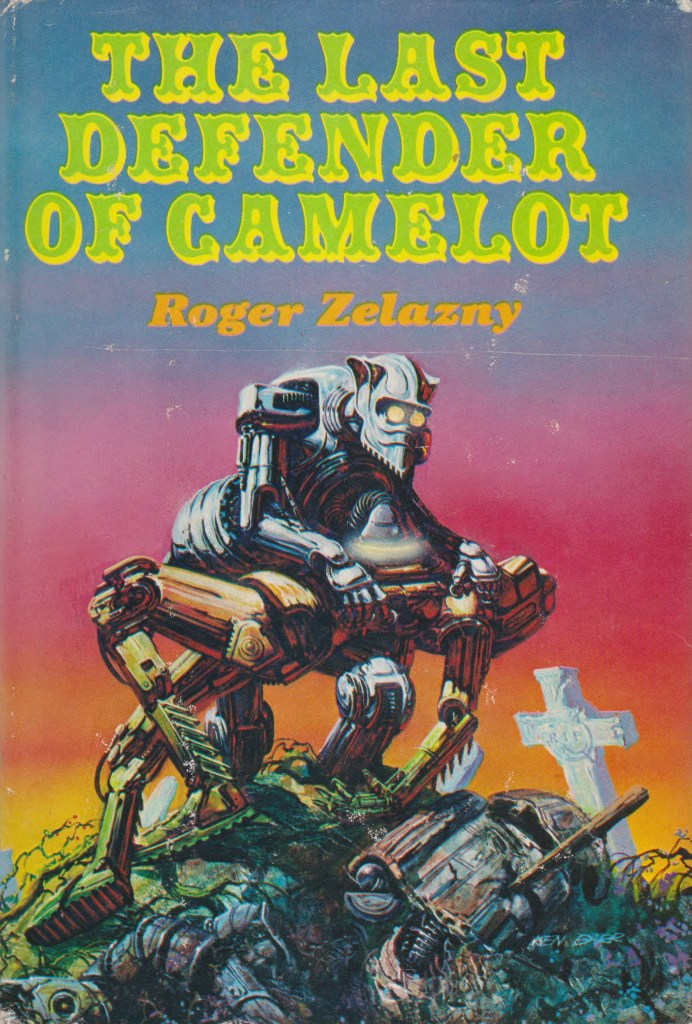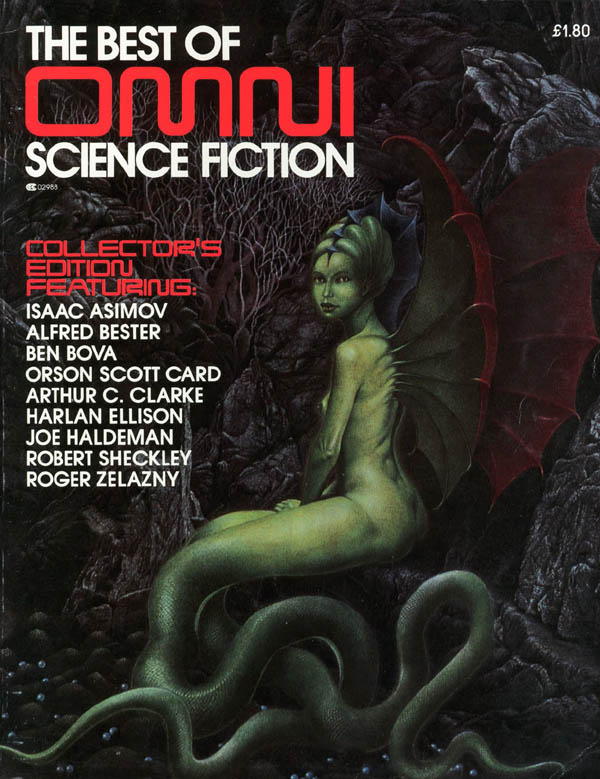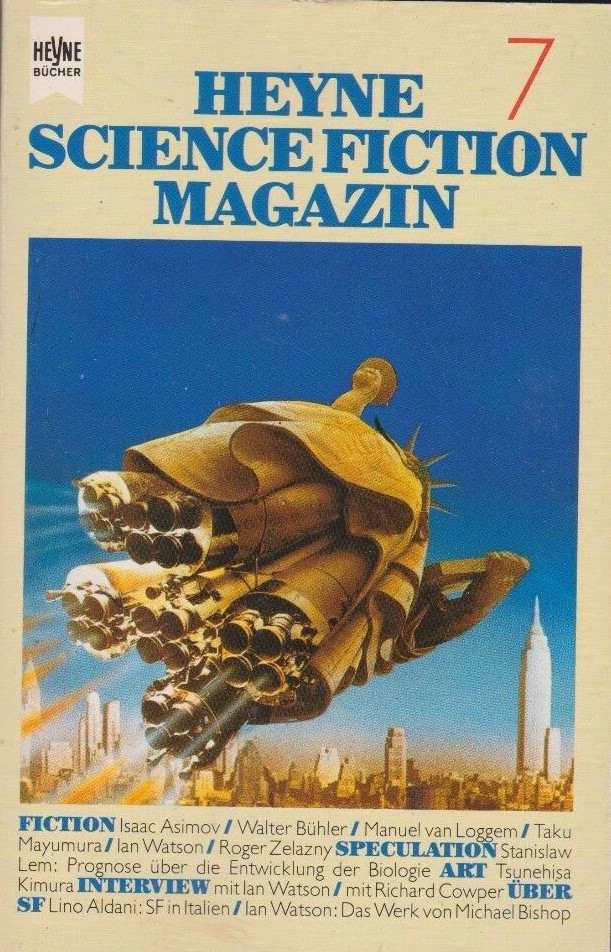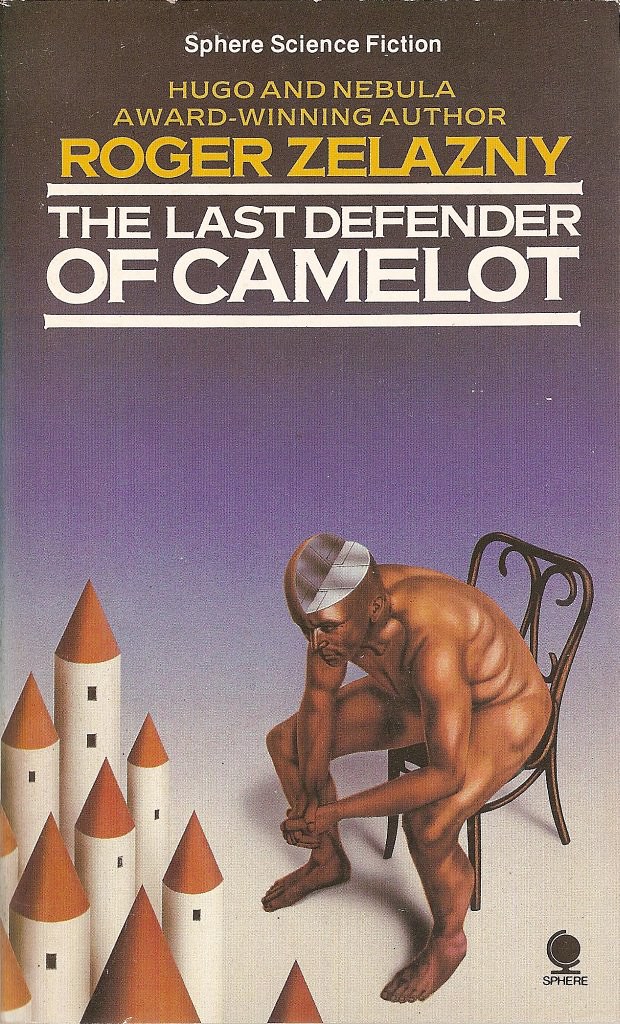
Don Dixon’s canvas (“Jupiter Seen from Io”) for Omni (June, 1979), ed. Ben Bova and Frank Kendig
The following review is the 10th post in my series searching for “SF short stories that are critical in some capacity of space agencies, astronauts, and the culture which produced them.” Some stories I’ll review in this series might not fit. And that is okay. I relish the act of literary archaeology.
As always, feel free to join the conversation!
Previously: Frederik Pohl’s (as Paul Flehr) “The Hated” (1958)
Up Next : Charles Runyon’s “First Man in a Satellite” (1958)

Ken Barr’s cover for the 1981 edition of Roger Zelazny’s The Last Defender of Camelot (1980)
3.5/5 (Good)
Roger Zelazny’s “Halfjack” first appeared in the June 1979 issue of Omni, ed. Don Dixon. You can read it online here. I read the story in the The Last Defender of Camelot (1980).
Exploring adjacent territory to Frederik Pohl’s “The Hated” (1958) and Samuel R. Delany’s “Aye, and Gomorrah” (1967), Roger Zelazny’s “Halfjack” speculates on the sexual allure cyborg spacemen hold on the planet-bound and the eternal restlessness of their souls. In vignette form, Zelazny constructs an effective mood piece as a cyborg named Jack lands on a planet in the “backwater limb of the galaxy” (275). He encounters Kathi, and after almost three months together reveals his secret–beneath his flesh bodyglove and hairpiece a “dark metal and plastic, precision-machined, with various openings and protuberances, some gleaming, some dusky” transformed body lies (276). In their lovemaking, Kathi begs him to remove his skin: “It really does something for me” (276). The modifications, a lateral hemicorporectomy, were Jack’s choice so he could hook himself into a special kind of spacecraft. While almost all of his biological self could be removed, Jack chose to keep his “stomach and balls and lungs, because I have to screw and breath to feel human” (277).
The last phrase—“to feel human”—forms the crux of the story as Jack struggles to create meaningful connections to other humans. Before he leaves Kathi for Morgana, his spaceship, he tells her that he is possessed by a wanderlust that triumphs over his deep attraction to her (277). Did the modifications create the wanderlust and desire for his ship’s company over that of the planet-bound? Or did the same desire to wander cause him to undergo the transformation in the first place? Did it change him at all?
It’s a polished and slick story that leaves just enough open to interpretation to tantalize. That said, “Halfjack” (1979) clocks in far from Zelazny’s best. Recommended for fans of SF on 70s visions of post-humanism and Zelazny completists.
On the site I’ve written positively about “The Keys to December” (1966), The Dream Master (1966), and “For A Breath I Tarry” (1966). Pre-site, I consumed with relish Zelazny’s classics This Immortal (variant title: And Call Me Conrad….) (1966) and Lord of Light (1967). Jack of Shadows (1971), Damnation Alley (1969), and Nine Princes in Amber (1970) have faired less well. Thinking back through his bibliography for this review, I realized that I never restarted Isle of the Dead (1969) after the spine of my copy split 60 pages in. Perhaps due for a reread?
Do you know any other stories of Zelazny’s short fictions that might fit the parameters of this project? Let me know in the comments.

Pierre Lacombe’s cover for the 1st edition of The Best of Omni Science Fiction, ed. Ben Bova and Don Myrus (1980)

Tsunehisa Kimura’s cover art for Heyne Science Fiction Magazin, #7 (1983), ed. Wolfgang Jeschke

Peter Goodfellow’s cover for the 1986 edition of Roger Zelazny’s The Last Defender of Camelot (1980)
For book reviews consult the INDEX
For cover art posts consult the INDEX
For TV and film reviews consult the INDEX
I’ve read more than a fair number of Zelazny’s novels and short fiction, but haven’t read this one before. As you say, it’s polished and slick. Zelazny’s a very good writer whose zippy style makes you read his pieces. I think this is an existential short story though, the central character torn between his synthetic existence and his humanity, but it could have been explored more deeply I think.
I felt the same on this one. Zelazny’s stories are always polished and easy to read despite the complexity of ideas (due to his engaging and evocative prose). But it felt a bit too slight… and could have explored the premise in a more sustained manner.
As I bring up in the review, is he torn between his synthetic existence and his humanity? Or did the same characteristics when he was fully human that compelled him to receive the surgery simply continue? Why else receive the modifications unless you already were dissatisfied with a “normal” existence?
Do you have any favorite Zelazny short fictions?
I’m not sure about what you call the complexity of his ideas. Zelazny’s fiction is I think often quite lightweight, as you say about this one, but is enlivened by his fizzy prose. I prefer complexity of ideas.
I suppose you mean if you’re not human in mentality. It seems though that he is also concerned about preserving his humanity.
I think “A Rose for Ecclesiastes”, but even that one I didn’t think is quite a near masterpiece.
Eh, I think there’s complexity of ideas in Lord of Light for example or Creatures of Light and Darkness. Maybe not his fantasy…
Yes, there is, but even in “Lord of Light”, it’s coloured by it ‘s prose, not fully realised. Haven’t read “Creatures of Light and Darkness”.
Yes, Isle of the Dead is due for a re-start. Not much complexity of ideas, but gorgeous writing, right up to the slightly disappointing ending. I especially liked the opening bit regarding Tokyo bay.
Hello Syd, it’s good to hear from you again. I hope all is well. I miss your blog posts.
Isle of Dead is such a small paperback — and a 70s edition is far less brittle than one from the 50s…. I tried to glue it back together (with book-binding glue) but I don’t think it completely worked. Need a new copy!
Have you read “Halfjack”?
Once I stopped writing all those posts, it was hard to go back to the grind. All is well, though, and I have been pursuing other writing projects.
I haven’t read Halfjack. Zelazny is probably my favorite – I’ve read almost all of his novels – but even with him I avoid stories of less than novella length. Chalk it up to burnout from too many Clarke, Heinlein, Ellison and Ballard shorts when I was starting out.
As hopefully that summary paragraph on his work demonstrated, my views of Zelazny wing wildly. I disliked Damnation Alley (the novelization) and adored This Immortal. I want to read more of his short fiction which is always slickly written (like this story).
Let me know if any short fictions (Zelazny or anyone else) come to mind that fit this series on 40s-70s negative/subversive takes on space travel!
Zelazny is a favorite, but I don’t worship him. I hated Damnation Alley and at first wasn’t overly impressed with Nine Princes in Amber. However I stayed on board for the whole ride, all ten books, and the whole was more than the sum . . . you know the cliche.
One thing about Zelazny I discovered recently. His short stories The Doors of His Face and the Lamps of His Mouth, and A Rose for Ecclesiastes were conceptually linked. They were consciously his last chance to write an old style treatment of Venus and Mars, respectively, before space probes killed them for romantic science fiction.
As for short fictions with subversive takes on the space program, I’m sure you saw Thomas Anderson’s review of The Pilgrim Project. As for me, I was an utter convert, ready for the space program before it existed, and I would have taken the jump in a heartbeat if I hadn’t been half blind and claustrophobic. I would never have read a negative story back then.
Now I find a lot to be negative about, mostly while reading between the lines in astronaut’s autobiographies. It still doesn’t blunt my enthusiasm, but it puts a new spin on my childhood.
I think there’s a difference between hero worship and realistic depictions of humans and all their flaws. Same thing with accounts of space travel that parrot and perpetuate colonization (the new frontier to be conquered through force and might and “superior” culture) vs. the complexities of cultures and peoples and struggling with our own brutal historical legacies.
I, in no way, seek to dismantle dreams of space or space travel but I enjoy reading stories that attempt to be critical and rebut dominate 50s narratives of technological progress.
Hence the project…
As for whether or not I would join the space program — absolutely 100% not. I enjoy earth and protecting earth. I detest narratives that suggest that the only way we will survive is go destroy another planet. This is, of course, from the perspective of someone who desires above all else to go live in the woods with a large garden — haha.
Considering dominate narratives of the 50s, any complexity in its depiction fascinates the historian in me. Which is one reason why most of the visions I’ve covered for this series — not the Zelazny obviously — are from the 50s.
As for Thomas’ review, I’ll go check it out — but I think it’s a novel rather than short story.
I come from a culture that loves hyperbole – although they just say exaggeration. Hence the phrase “hero worship”. I also would love to live in the woods, but without a garden because I grew up working my butt off on a farm. My favorite author back then was Andre Norton because I could get off the rocket on page two and spend the rest of the book in the wilderness.
I agree with your project, now, but I would not have then, so I have no stories suggestions. My new take on the space program comes from a recent understanding that Chuck Yeager was instrumental in getting rid of the first black astronaut trainee, that the astronauts petitioned Washington to fly missions in Viet Nam while waiting for their launches, and from the politicking for who got to go on what mission.
I never considered them heroes, I was just wanted to go. Now I know they were not people I would have enjoyed hanging out with, even if I could have ticked spaceman off my twelve year old bucket list. Sometimes we are lucky in what we don’t get.
For this series I might write up my thoughts on The United States Astronauts and their Families: A Pictorial Presentation (1965). I think it narrows in on the “hero worship” element.
In this publication each astronaut is allotted a two-page spread replete with staged photos of their family life and hobbies. Otis L. Wiese, the editor of the volume, proclaims grandiosely “Man’s reach for the world of space is born of his insatiable curiosity about the unknown… his indomitable drive for accomplishment… his instinctive response to a challenge. Astronauts-Husbands-Fathers: these men are the men featured here but it’s essentially as family men that we portray them.”
The photographs are fascinating. Roger B. Chaffee’s wife Martha teaches him lunar geography (22), L. Gordon Cooper, Jr. sits at the helm of his speedboat Bluebonnet which is capable of reaching 80 knots (28), in another photo him and his family spend time with their German shepherd (29), Donn F. Eisele teaches his daughter “the finer points of marksmanship” (35), while Alan B. Shepard, Jr. plays piano tunes for his daughters (61) and in the facing image shakes hands with John F. Kennedy (61).
Their families illustrate the epitome of the American family: the ultra-masculine man with his cars and boats, the supportive wife facilitating her husband’s heroic greatness, and a gaggle of adoring children. Many captions establish parallels between the job of being an astronaut and his family life.
Re-your Yeager comment. I did not know that. Wow. Thank you for letting me know. A lesser instance that comes to mind as well is Donn F. Eisele who was almost kept off an Apollo mission because of rumors of his extra-marital affair… Which, of course, utterly deflates the publication’s conception of the astronaut family.
Wow. I have one thing to add, an essay I stumbled onto while researching a post. It is a letter from Sharman Apt Russell to her father, written fifty years after his death while testing the X-2.
https://www.terrain.org/essays/23/russell.htm
Thank you! I’ll take a look.
This story would make a fine country and western song for cyborg space cowboys.
Speaking of SF space cowboys, have you seen the bizarre yet amazing musical indie film The American Astronaut? https://www.imdb.com/title/tt0243759/
Here’s a highlight: https://www.youtube.com/watch?v=641MJPP3eaI&ab_channel=yoshi285
No, I haven’t but I will look into them, thank you for the recommendation. I like Russell Hoban, too. It’s been a while so I should reread Ridley Walker and Lion.